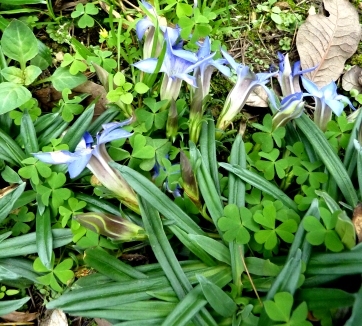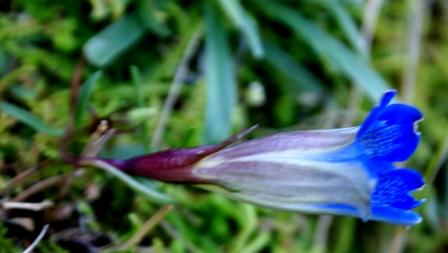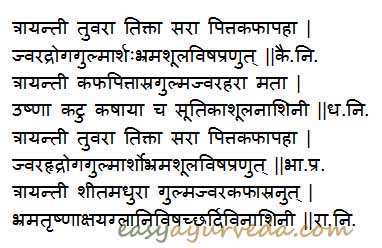Trayamana: Gentiana kurroo: Benefits, Remedies, Research, Side Effects
Trayamana- Gentiana kurroo is an Ayurvedic herb useful in the treatment of wound, skin diseases, dysmenorrhea, fever and liver disorders etc.
Latin name- Gentiana kurroo Royale
Family- Gentianaceae (Bhunimba kula)

Table of Contents
Vernacular names
Names in different languages:
Hindi name- Kadu
English name-Indian gentian, Himalayan Gentian,
Bengali name- Karu, Koutki, chireta, kadu, trayaman
Gujarathi name- Pakanbas
Kannada name- Karadihanni, kiriyatu
Kashmiri name- Kadu
Marathi name- Pakanbhed
Malayalam name- Trayamana, kiriyat
Punjabi name- Nilkanth, Kamalphool
Tamil name- Kamantirai, kampantirai, nilavempu, nilavimbu
Telugu name- Kalu kranuga, Buroni, nelavemu
Urdu name- Nilkanth
Manipuri name – Kiryet
Sanskrit synonyms
Trayanti, Grirjanuja, Girisanuja, Palanika, Ardra,
Phalini – bears fruits
Kritatrana, Varshika, Trana, Sunamika, Sukama
Devabala, Rakshani, Baladeva, Balabhadra, Mangalya – auspicious
Bhayanashini – relieves the fear of disease

Morphology
Trayamana is a small herb growing in the Himalayan range and in the hilly regions of India. The plant can be found growing to a height of 1 foot in between the stones and cliffs. The flowers are dark blue to purple color and the fruits are 0.5 to 0.75 inch in diameter. The flowers are seen after the rainy season. The root of the plant is brown or ash colored.
Classical categorization
Charaka- Kashaya skanda – astringent tasting group of herbs
Sushruta- Lakshadi gana
Dhanvantari Nighantu- Guduchyadi varga
Bhavaprakasha- Guduchyadi varga
Kaiyyadeva Nighantu- Oushadhi varga
Raja Nighantu- Parpatadi varga
Scientific classification
Kingdom: Plantae
Order: Gentianales
Family: Gentianaceae
Genus: Gentiana L.
Properties, part used, dosage
Gentiana kurroo medicinal properties:
Rasa (Taste) -Tikta (Bitter)
Guna (Qualities) – Laghu (Light for digestion), Ruksha (Dry in nature)
Vipaka – Katu (Undergoes Pungent taste after digestion)
Veerya (Potency) – Ushna (Hot)
Karma (Actions) – Kaphavata shamaka (reduces vitiated kapha and vata dosha)
Part used- Root
Dosage-
1 to 3 g of root powder
30 to 40 ml of decoction
Chemical constituents
Chemical constituents of Gentiana kurroo:
The most important constituents of the herb are secoiridoid bitter compounds, amarogentin and gentiopicroside, together with traces of swertiamarin and sweroside. The roots also contain al- kaloids, gentianine and gentioflavine, xanthones,and bitter oligosaccharides, gentiobiose and gentianose. Amarogentin, gentiopicrin, swertiamarin, and sioeroside (iridoid monoterpenes) are toxic constituents.
Uses
Uses of Trayaman:
- The decoction of the root of Trayamana is used to treat fever and is considered as a blood purifier and carminative.
- The decoction of the root of Gentiana kurroo is useful to treat leucoderma and syphilis.
- The powder of the root of the plant is given with honey in a dose of 3 to 5 g to treat cases of poisoning.
- The paste of the powder is applied over areas affected with alopecia as part of treatment.
- The cold infusion of the root is given to treat indigestion and piles.
- The root powder is substituted with the root of Katuki (P.kurroo) and used for purgation.
- In cases of hemorrhage from small vessels, the medicated ghee prepared from the juice of Trayamana is given with honey.
- Cold infusion of the root is given to treat difficulty in micturition and dysmenorrhea.
Sanskrit verse

Indications
Uses of Indian Gentian as per Ayurveda:
Balances Pitta and Kapha Dosha
Indicated in –
Jwara – fever
Hrudroga – cardiac disorders
Gulma – Tumors of the abdomen
Arsha – hemorrhoids
Bhrama – Delusion, Dizziness
Shoola – abdominal colic pain
Visha – Toxic conditions, poisoning
Sutika shoola – relieves the abdominal pain of a new mother after delivery.
Bhrama – Delusion, Dizziness
Trushna – excessive thirst
Kshaya – depletion of body tissues, weight loss, tuberculosis
Glani – fatigue, tiredness
Visha – Toxic conditions, poisoning
Chardi – Vomiting
Ayurvedic medicines
Ayurvedic medicines containing Trayamana:
Ardraka Ghrita: Ardraka ghritam is an Ayurvedic medicine, in herbal ghee form. It is used for preparatory procedure for Panchakarma and also as medicine, used in the treatment of indigestion, chronic diarrhea, anorexia etc.
Kottakkal Maha Tiktaka Lepa: It is a proprietary medicine useful for the treatment of various skin diseases and non- healing ulcers.
Patoladi choorna: Patoladi Choornam is an Ayurvedic medicine in herbal powder form, used in the treatment of digestive, cardiac and liver disorders.
Adverse effects, Research
Adverse effect: No known adverse effect is known or reported from the use of Trayamana.
Research articles related to Gentiana kurroo:
Anti- inflammatory action: Different plant extracts used in the current study were found to show an anti-inflammatory activity. As compared to control group the treated groups showed decrease in the edema formation after 4 hrs.
Interaction with medicines, supplements
Can this be used while taking Homeopathic medicine?
Yes. This product does not react with homeopathic medicine.
Can this medicine be continued while taking supplements like multivitamin tablets, Omega 3 fatty acids etc?
Yes. Generally, this product goes well with most dietary supplements. However, if you are taking more than one product per day, please consult your doctor for an opinion.
With western
medicines
Seek your
doctor’s advice if you are taking this product along with other western
(allopathic / modern) medicines. Some Ayurvedic herbs can interact with modern
medicine.
If both Ayurvedic and allopathic medicines are advised together, then it is
best to take Allopathic medicine first, wait for 30 minutes and then take the
Ayurvedic medicine.
Author: Dr.B.K.Prashanth M.D (Ayu), Ph.D
E mail: [email protected]
Sthanika Karma (Systemic Action)
External Application – Cleanses the wounds and promotes faster healing. Beneficial in skin disorders and promotes hair growth. external application of its paste is indicated in Alopecia.
Internal administration-
Digestive system – Carminative, Helps to remove toxic metabolic waste from the body, Stimulates the release of bile, Purgative, Ant helminthic and facilitates normal movement of vata dosha. Indicated in Loss of appetite, indigestion, Liver disorders, Malabsorption syndrome, Helminthiasis, Ascites, Abdominal distension etc.
Circulatory system – Acts as a blood purifier
Reproductive system – Induce menstruation, Improve breast milk production in lactating mother.
Tvak – Indicated in skin diseases.
Tapakrama – Indicated in fever
Satmikarana – Indicated in Anemia and post viral complications.










One comment
aman
Hello dr..is this herb available as single tablet or powder form?